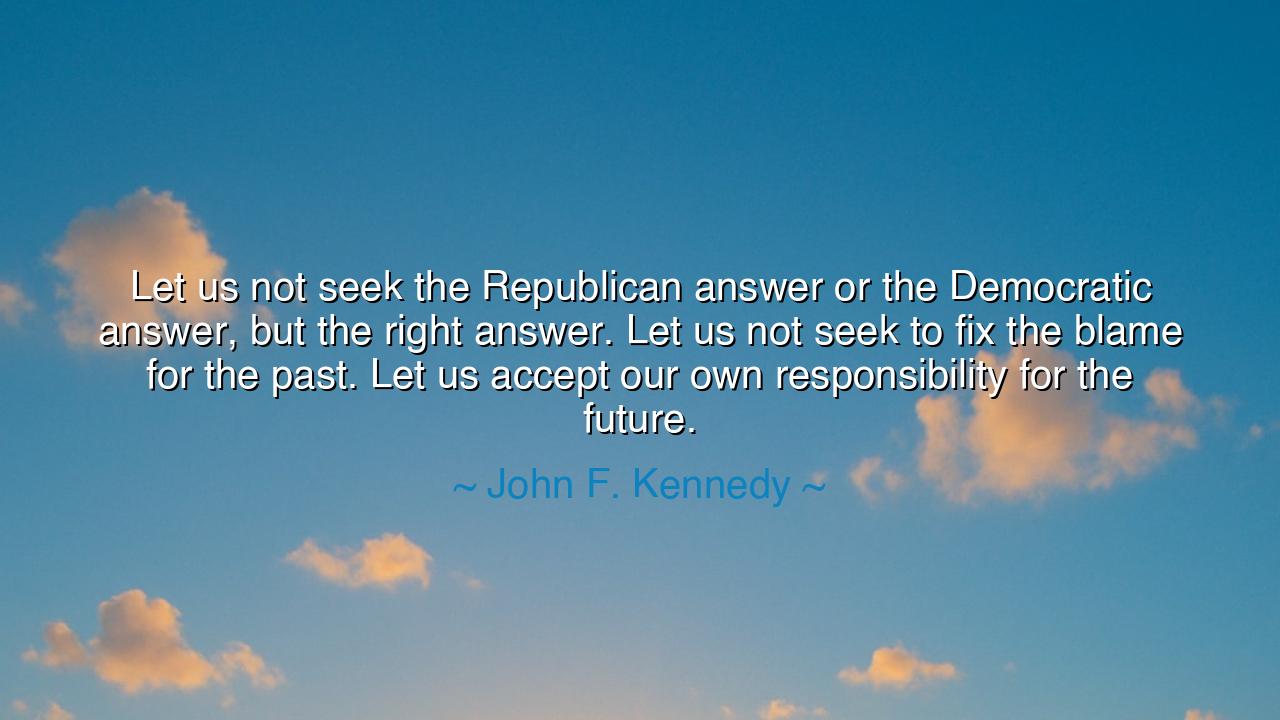
Let us not seek the Republican answer or the Democratic answer
Let us not seek the Republican answer or the Democratic answer, but the right answer. Let us not seek to fix the blame for the past. Let us accept our own responsibility for the future.






The words of John F. Kennedy—“Let us not seek the Republican answer or the Democratic answer, but the right answer. Let us not seek to fix the blame for the past. Let us accept our own responsibility for the future”—ring through the ages like the tolling of a great bell, summoning all who hear to rise above division and take up the burden of wisdom. In this call, Kennedy does not speak as a politician, but as a prophet of unity—a man who understood that the strength of a nation does not lie in its parties, but in its principles; not in the quarrels of its leaders, but in the courage of its people. His words are a plea to abandon the comfort of sides and embrace the harder, nobler path: the pursuit of truth, wherever it may lead.
In the spirit of the ancients, this teaching might be compared to the counsel of the philosopher-kings of old, who warned that factions and pride would undo the harmony of the state. The right answer, Kennedy reminds us, is not born from loyalty to tribe or banner—it is born from justice, from conscience, and from the clear vision of those who love truth more than victory. Like the wise rulers of Athens or the sages of China, Kennedy understood that governance rooted in division becomes a house divided against itself. His words call us back to the sacred idea that leadership is not about winning arguments, but about serving the good of all.
The origin of this quote can be traced to the early years of Kennedy’s presidency, during a time of turbulence and transformation in America. The Cold War loomed, racial tension rose, and mistrust brewed within the heart of the nation. Yet Kennedy, standing before these trials, sought not to deepen the divide, but to heal it. His vision was not of red or blue, of conservative or liberal, but of a people united in their common destiny. By speaking of “our own responsibility for the future,” he reminded the citizens of his time—and of all times—that democracy demands not spectators, but stewards; not complainers, but creators of change.
The ancients told of the Roman Republic, where in its earliest days, leaders like Cincinnatus laid down personal power for the sake of the greater good. Yet as time passed, Rome’s leaders forgot this virtue. They chose faction over nation, vengeance over vision, and in doing so, they destroyed the republic from within. Kennedy’s words, though spoken centuries later, echo this ancient warning: when we care more for party than for principle, we surrender the very soul of the state. The blame of the past is a shadow we may study, but never dwell in. To linger there is to forget the dawn that still awaits.
Kennedy’s message is not merely political—it is moral. It speaks to every person, in every generation, who faces the temptation to criticize rather than to create. To “accept our own responsibility for the future” is to live as the ancients lived: with honor, humility, and purpose. It is to understand that the world we inherit is both gift and challenge, and that our duty is not to lament its flaws, but to improve it. The wise have always taught that the measure of a people is not how they assign blame, but how they build anew. For what use is it to curse the darkness of the past, if we do not kindle a light for those yet to come?
Consider the example of Abraham Lincoln, who, in the midst of civil war, refused to let bitterness rule his heart. Though surrounded by division, he sought not to punish, but to reconcile. His famous words—“With malice toward none, with charity for all”—carry the same spirit as Kennedy’s. Both men knew that true leadership is not about domination, but about healing; not about proving who is right, but about ensuring that what is right prevails. Such leaders remind us that unity is not the absence of disagreement—it is the presence of purpose stronger than disagreement.
So, my child, take this lesson to heart: seek the right answer, not the easy one, not the partisan one, but the one that serves justice, compassion, and truth. When others quarrel over who to blame, stand firm and ask instead, “What can I do to make it better?” For the destiny of the world is not shaped by those who point fingers, but by those who extend hands. The ancients would say: the noblest soul is the one who accepts responsibility, who tends to the future as a gardener tends to the earth, planting seeds whose fruit they may never taste.
Thus, remember the wisdom of John F. Kennedy: “Let us not seek to fix the blame for the past. Let us accept our own responsibility for the future.” In these words lies the path to greatness—for nations, and for individuals. The past may instruct, but it must not imprison. The future calls, and it calls for builders, for dreamers, for those who stand above division and walk in truth. Let your loyalty be not to faction, but to righteousness; not to power, but to purpose. For only those who take responsibility for tomorrow can truly claim the honor of shaping it.






AAdministratorAdministrator
Welcome, honored guests. Please leave a comment, we will respond soon